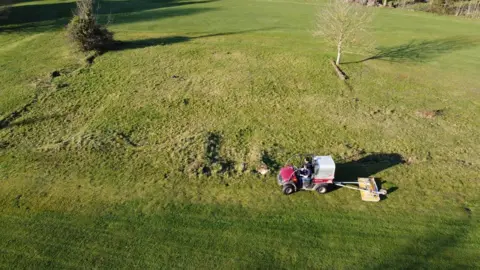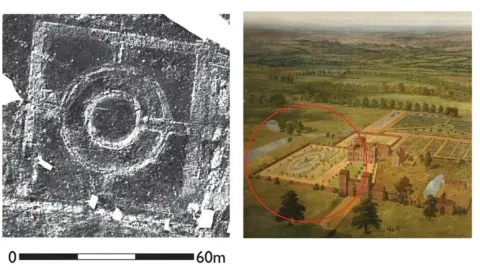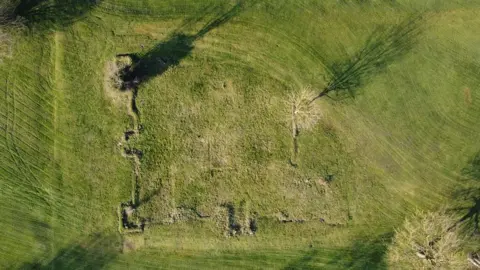Remains of Tudor gardens discovered under Essex golf course
 Historic England
Historic EnglandThe remains of 17th Century gardens have been discovered under the fairway of a golf course in Essex.
Historic England carried out research at Belhus Park in Thurrock after volunteers found early Tudor and Jacobean features at the site.
The grounds of the former Belhus Park estate have been on the Heritage at Risk Register since 2018.
Christopher Laine, from Historic England, said the area was "a designed landscape of great historic interest".
He added the discovery of the gardens would help conserve "this important heritage for current and future generations".
 Historic England/Thurrock Museum
Historic England/Thurrock MuseumThe revelation was made through the Designed Landscapes project - which encourages the local population to rediscover "hidden gems" around them.
The five-year, £2.4m scheme is a collaboration between The Gardens Trust, Land of the Fanns and the golf course owners.

Belhus Park history
 Historic England
Historic EnglandBelhus Park, close to the M25 at Thurrock, lies in the heart of an ancient woodland.
The original manor was lived in from the 14th Century and passed through marriage to the Barrett family, who rebuilt the house towards the end of the 16th Century.
By the mid-17th Century they had built up one of the largest estates in Essex.
Following a period of neglect, the house and grounds were updated by Lord Dacre between 1744 and 1777, with Lancelot "Capability" Brown commissioned to remodel the grounds between 1753 and 1763.
During World War Two, Belhus was damaged by bombing and military occupation. The house was demolished in 1957.
Source: Historic England

Initial investigations by volunteers revealed "the hint of a garden feature" on satellite images and remote sensing data.
The detail appeared to mirror a 1619 pictorial survey of Belhus Park and a late 17th to early 18th Century painting, depicting a bird's eye view of the property.
It suggested the layout of the former gardens had survived - despite a redesign by Lancelot "Capability" Brown in the mid-18th Century.
Historic England then carried out detailed on-site research, which confirmed significant parts of the original garden design beneath the green.
Neil Linford, senior geophysicist for Historic England, said: "We were very excited when we started to see the image of the Tudor water garden appear on the laptop screen as we were collecting the data - that made all the hard work very worthwhile."
Historic England said the discovery will allow it, and other organisations, to "protect and restore this historic landscape".

Find BBC News: East of England on Facebook, Instagram and Twitter. If you have a story suggestion email [email protected]
